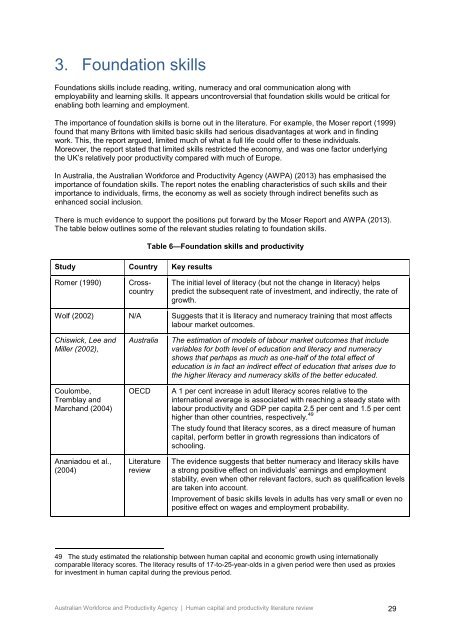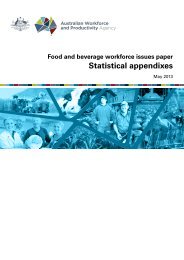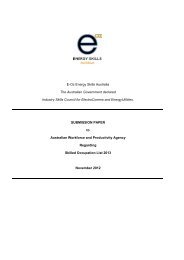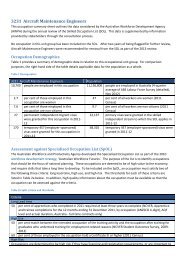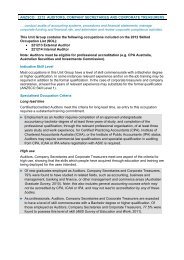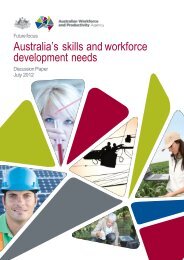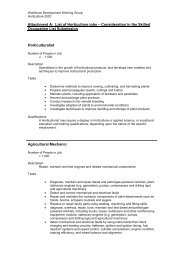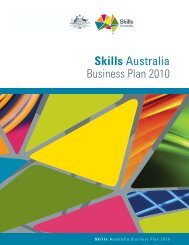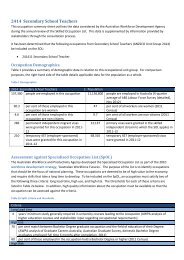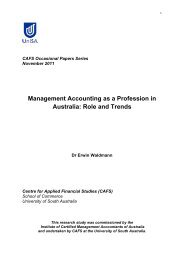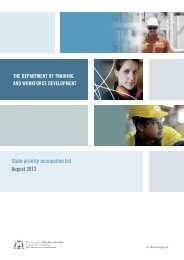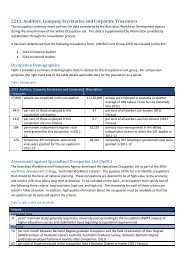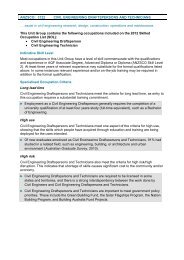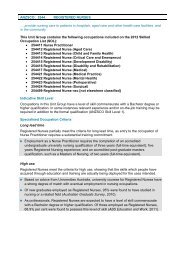3. Foundation skillsFoundations skills include reading, writing, numeracy <strong>and</strong> oral communication along withemployability <strong>and</strong> learning skills. It appears uncontroversial that foundation skills would be critical forenabling both learning <strong>and</strong> employment.The importance of foundation skills is borne out in the literature. For example, the Moser report (1999)found that many Britons with limited basic skills had serious disadvantages at work <strong>and</strong> in findingwork. This, the report argued, limited much of what a full life could offer to these individuals.Moreover, the report stated that limited skills restricted the economy, <strong>and</strong> was one factor underlyingthe UK’s relatively poor <strong>productivity</strong> compared with much of Europe.In Australia, the Australian Workforce <strong>and</strong> Productivity Agency (<strong>AWPA</strong>) (2013) has emphasised theimportance of foundation skills. The report notes the enabling characteristics of such skills <strong>and</strong> theirimportance to individuals, firms, the economy as well as society through indirect benefits such asenhanced social inclusion.There is much evidence to support the positions put forward by the Moser Report <strong>and</strong> <strong>AWPA</strong> (2013).The table below outlines some of the relevant studies relating to foundation skills.Table 6—Foundation skills <strong>and</strong> <strong>productivity</strong>Study Country Key resultsRomer (1990)CrosscountryThe initial level of literacy (but not the change in literacy) helpspredict the subsequent rate of investment, <strong>and</strong> indirectly, the rate ofgrowth.Wolf (2002) N/A Suggests that it is literacy <strong>and</strong> numeracy training that most affectslabour market outcomes.Chiswick, Lee <strong>and</strong>Miller (2002),Coulombe,Tremblay <strong>and</strong>March<strong>and</strong> (2004)Ananiadou et al.,(2004)AustraliaOECDLiteraturereviewThe estimation of models of labour market outcomes that includevariables for both level of education <strong>and</strong> literacy <strong>and</strong> numeracyshows that perhaps as much as one-half of the total effect ofeducation is in fact an indirect effect of education that arises due tothe higher literacy <strong>and</strong> numeracy skills of the better educated.A 1 per cent increase in adult literacy scores relative to theinternational average is associated with reaching a steady state withlabour <strong>productivity</strong> <strong>and</strong> GDP per capita 2.5 per cent <strong>and</strong> 1.5 per centhigher than other countries, respectively. 49The study found that literacy scores, as a direct measure of human<strong>capital</strong>, perform better in growth regressions than indicators ofschooling.The evidence suggests that better numeracy <strong>and</strong> literacy skills havea strong positive effect on individuals’ earnings <strong>and</strong> employmentstability, even when other relevant factors, such as qualification levelsare taken into account.Improvement of basic skills levels in adults has very small or even nopositive effect on wages <strong>and</strong> employment probability.49 The study estimated the relationship between human <strong>capital</strong> <strong>and</strong> economic growth using internationallycomparable literacy scores. The literacy results of 17-to-25-year-olds in a given period were then used as proxiesfor investment in human <strong>capital</strong> during the previous period.Australian Workforce <strong>and</strong> Productivity Agency | <strong>Human</strong> <strong>capital</strong> <strong>and</strong> <strong>productivity</strong> literature review 29
Earl (2010)NewZeal<strong>and</strong>For males who have not completed school, higher levels of literacyare strongly associated with employment. For those that havecompleted school or have qualifications the separate effects ofliteracy on employment are not as marked.Shomos (2010) Australia An improvement in LLN from level 1 to level 3 is associated withabout a 25 <strong>and</strong> 30 per cent increase in wages for women <strong>and</strong> men,respectively.An improvement in LLN from level 1 to level 3 is associated with a 5<strong>and</strong> 15 percentage point increase in the likelihood of labour forceparticipation for men <strong>and</strong> women, respectively.The effect of education on labour market outcomes was reduced butstill positive for most levels of attainment after controlling for literacy<strong>and</strong> numeracy scores.Curtis (2010) Australia Literacy has a strong association with employment outcomes evenafter taking account of qualifications.Those with higher levels of qualifications receive higher additions totheir wages for a given level of literacy than those with lower or noqualifications.Heckman <strong>and</strong>Kautz (2012)USCognitive ability measures do not adequately capture, soft skills—personality traits, goals, motivations, <strong>and</strong> preferences—that arevalued in the labour market, in school, <strong>and</strong> in many other domains.The link between soft skills <strong>and</strong> labour market outcomes is causal<strong>and</strong> they have an important place in an effective portfolio of publicpolicies.The above studies provide strong evidence of a positive association between foundation skills <strong>and</strong><strong>productivity</strong>. 50 However, achieving <strong>productivity</strong> gains through improved foundation skills can bechallenging. Attempts to improve foundation skills in the adult population indicate that it may bedifficult to design effective programs to enhance such skills. Wolf et al (2010) 51 <strong>and</strong> Krueger <strong>and</strong>Rouse (1994, 1998) 52 are examples of studies that considered the results of programs to improvefoundation skills.The literature indicates that foundations skills are more easily developed during an individual’sformative years. 53 However, this is not to say that interventions later in life cannot be successful withcareful design. Some of the design considerations that appear important include: ensuring employerssupport the program <strong>and</strong> are behind its implementation; ensuring that learners improve their literacyto a degree that will change their work performance or lead to additional job opportunities; recognisingthat there are likely to be benefits from foundation skills that are external to both firms <strong>and</strong> individuals;recognising that foundation skills may take some time to improve <strong>and</strong> communicating this toemployers <strong>and</strong> those undertaking training; <strong>and</strong>, targeting those individuals <strong>and</strong> firms that st<strong>and</strong> tobenefit the most from improved foundation skills (i.e. those firms <strong>and</strong> individuals that are being heldback).50 See also Burke 2010 which provides an overview of relevant Australian <strong>and</strong> New Zeal<strong>and</strong> data <strong>and</strong> analysis.51 Wolf et al (2010) conducted a longitudinal study that tracked 53 workplaces hosting subsidised basic skillscourses, <strong>and</strong> examined the impact on the enterprises themselves as well as on learners. The study found thatcontrary to policy-makers’ expectations, employers were not particularly concerned about employees’ literacylevels, <strong>and</strong> supported the provision largely as a way of providing general development opportunities. Oncesubsidies ended, employers were generally unwilling to support further provision at full cost suggesting that theprogram did not have an immediate impact on performance. Overall, the authors found that the program had nolasting impact.52 Krueger <strong>and</strong> Rouse (1994, 1998) examined the impact of a workplace literacy program on a variety ofemployment outcomes for individual employees, such as earnings, staff turnover, <strong>and</strong> absenteeism. The studyanalysed a basic skills tuition program that was delivered to 480 low-skilled, hourly-paid workers at two mid-sizedNew Jersey (US) companies (one service, one manufacturing). Overall, it was found that in the service company,there was no significant effect on wage growth for program participants compared to non-participants, while inthe manufacturing company there was a larger growth in earnings for trainees compared to non-trainees.53 See footnote 38 which discusses Leuven, Lindahl, Oosterbeek <strong>and</strong> Webbink (2004).Australian Workforce <strong>and</strong> Productivity Agency | <strong>Human</strong> <strong>capital</strong> <strong>and</strong> <strong>productivity</strong> literature review 30
- Page 1 and 2: Human capital andproductivityLitera
- Page 3 and 4: Table of ContentsAbstract .........
- Page 5 and 6: Executive summaryIt has long been r
- Page 7 and 8: 1. IntroductionObjectivesThis liter
- Page 9 and 10: 2. Learning and productivityThis se
- Page 11 and 12: Table 1—Formal learning and indiv
- Page 13 and 14: Study Country 10 Key resultsCully (
- Page 17 and 18: post-school qualification. In parti
- Page 19 and 20: Study Country Key resultsKrueger an
- Page 21 and 22: However, some firm level studies ha
- Page 23 and 24: Table 4—Learning and productivity
- Page 25 and 26: Section 4 of this review considers
- Page 27 and 28: Table 5—Importance of different l
- Page 29: employed workers do not need to sig
- Page 33 and 34: 4. Learning and innovationThe liter
- Page 35 and 36: OECD (2010) N/A Considered that hum
- Page 37 and 38: 5. Leadership and managementAs note
- Page 39 and 40: Australian Instituteof Management(2
- Page 41 and 42: Figure 1—Distribution of manageme
- Page 43 and 44: 7. ConclusionThe literature examini
- Page 45 and 46: ReferencesAcemoglu, D. and Pischke,
- Page 47 and 48: Boedker, C., Vidgen, R., Meagher, K
- Page 49 and 50: Green, F. (2006), Non-Certified lea
- Page 51 and 52: Leuven, E., Lindahl, M., Oosterbeek
- Page 53 and 54: Shomos, A. (2010), Links Between Li
- Page 55: Australian Workforce and Productivi


